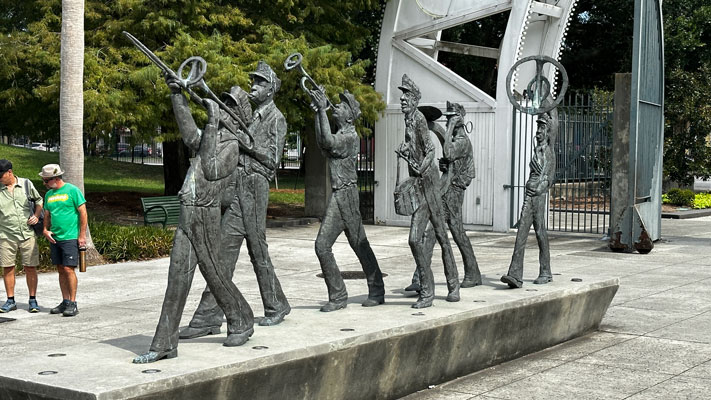Jon Johnson File Photo/Gila Herald: This statue in Congo Square/Louis Armstrong Park in New Orleans celebrates black musicians. This year’s national theme for Black History Month is “African Americans and the Arts.”
Contributed Article/Courtesy the American Red Cross
TUCSON – Black History Month centers on the outstanding achievements of Black Americans. With the theme “Black Excellence Is in Our Blood,” the American Red Cross honors the vibrant legacies of trailblazers whose collaborative spirit of excellence continues to shape our humanitarian mission.
Frederick Douglass, a prominent Black abolitionist and author who escaped slavery, supported Clara Barton’s efforts to establish the American Red Cross. Having been impressed by Barton’s aid to Black soldiers during the Civil War and her desire to improve the protection of the wounded during wartime, Douglass signed the original Articles of Incorporation for the Red Cross in 1881. February is designated Black History Month to honor Douglass’ birthday, February 14.
Howard University, one of the nation’s top HBCUs (Historically Black Colleges and Universities), formed its Red Cross Unit in March 1917 under the leadership of Red Crosser Hallie E. Queen. The students at Howard, determined to aid the war effort, met daily to make 1,000 hospital supplies before the semester ended and coordinated entertainment for Black soldiers stationed at Fort Meade. Howard University carries on this tradition through its Red Cross Club, which hosts blood drives and completes community service projects.
In honor of this year’s national theme for Black History Month – “African Americans and the Arts,” the Red Cross celebrates artists of African descent who have used their talents to express support for the Red Cross mission and empower society.
- Louis Armstrong, a world-famous jazz trumpet player, hosted a benefit concert in support of the Red Cross to aid urban communities impacted by the historic Pittsburgh flood. Armstrong’s and others’ responses to Red Cross disaster relief appeals helped raise nearly $8 million that year.
- Marian Anderson, a world-famous opera singer who was the first Black American invited to sing at the White House and the Lincoln Memorial, sang at the Red Cross World War II relief concert at Constitution Hall in 1943. The performance was historic in helping to evoke wartime unity, raise funds for the Red Cross, and work towards racial equality and inclusion.
- Duke Ellington, a renowned jazz pianist and composer, devoted his music career to innovating jazz while advancing racial equality and humanitarianism. He recorded PSAs for the Red Cross supporting disaster services and frequently attended Red Cross rallies and benefits.
- Maceo Jefferson, an American jazz composer, and WWI veteran worked for the American Red Cross in the 1940s, delivering food and medicine from the U.S. to French civilians and prison camps as part of a pre-WWII relief effort. More than 2.5 million children benefitted from donations of milk and clothing as part of this effort.
Nikkolas Smith is a contemporary artist and children’s book author commissioned by the Red Cross in 2023 to create a digital portrait entitled “Transfusion” supporting the Sickle Cell Initiative. Smith aims to help raise broader awareness about sickle cell disease and Black donors’ role in providing a compatible blood match.
Dr. Charles R. Drew, a surgeon and pioneer of modern blood banking, was named the first Red Cross-National Blood Collection Program medical director in 1941. His work with the Red Cross helped save the lives of hundreds of thousands of soldiers and civilians during World War II. Dr. Drew’s efforts to increase the blood supply led to bloodmobiles and other collection, preservation, and distribution processes still used today.
Black Excellence Is in Our Blood” is more than a mantra. Blood donations from individuals who are Black play a vital role in meeting the broader transfusion needs of patients and those with sickle cell disease. That’s why the Red Cross is teaming up with partners in the Black community to rally blood donors to give in honor of Black History Month.
- In the U.S., it is estimated that over 100,000 people — the majority of whom are of African descent — have sickle cell disease and may require regular blood transfusions to help manage their disease.
- One in 3 African American blood donors is a match for people with sickle cell disease.
- Fifty-one percent of individuals who are Black have type O (positive or negative) blood.
- Type O blood is often in critical supply as hospitals most often need it.
- Distributions of this vital blood type to hospitals have been reduced this winter due to supply constraints.
- Type O negative is the universal blood type that can be transfused to patients of any other blood type and is routinely in short supply.
Join us in thanking and elevating Black Excellence during Black History Month by rolling up a sleeve to give blood. Use the Red Cross Blood Donor App, visit RedCrossBlood.org/OurBlood, or call 1-800-RED CROSS (1-800-733-2767) to schedule an appointment today.








